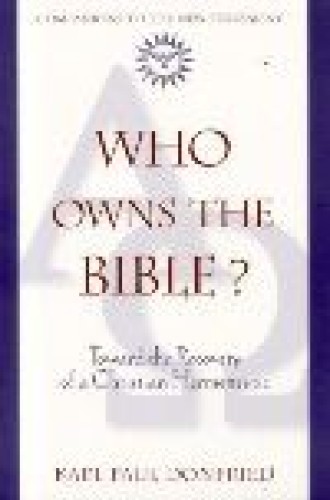Who Owns the Bible?
Much of the debate in the church over the issue of homosexuality has been far from edifying, and too many arguments simply rehearse points made earlier without advancing the discussion in any material way. This is just the kind of intellectual conflict in which it is wise to step back from the debate itself and examine the presuppositions that underlie the various positions. In other words, this is the kind of place where the study of hermeneutics is helpful and informative.
Lately there has also been a vigorous debate among scholars concerning the character, function and future of academic biblical scholarship. The older historical-critical method has come under fire from a number of positions, and Christians have begun to wonder whether this methodology is useful for the church in its mission and worship. Who Owns the Bible? draws upon and addresses both of these conversations. The title is Karl Paul Donfried’s way of gesturing toward the second discussion. He is addressing not who literally owns the Bible, but rather what is the proper manner in which to read and interpret the Bible in the community of faith.
Not long ago members of the academy were claiming that the historical-critical method was the necessary foundation for any serious engagement of the text by any community, religious or otherwise. Donfried’s response to this claim is indicated in his subtitle. He argues that although the church may use and learn from serious biblical criticism (and there are abundant examples of it in his book), the main orientation of ecclesial biblical interpretation is quite distinct from that of the academic guild of biblical scholarship.
The issues raised are important ones. In a world of war, poverty and oppression it still matters how we ground ourselves in scripture and Christian faith. The daily task of reflecting upon, teaching and living out a biblical faith with and for our congregations is the meat and potatoes of Christian ministry. How can we rightly live as people of the Word today?
Donfried proposes a “Trinitarian hermeneutic of Scripture.” This sounds good, and the Trinity is a hot topic in theology today—but what does Donfried really mean? Unfortunately, the Trinity has almost nothing to do with his approach to the texts he examines. He adopts J. Christiaan Beker’s suggestion that although there is a “coherent message” to the Bible, many texts represent “contingent applications” that need to be examined carefully and critically. In addition to taking this Reformed approach, Donfried insists that an adequate Christian biblical hermeneutic must embrace “the Christ event in all its fullness,” which includes the history of Israel, of Jesus and of the earliest disciples.
From this solid ground, Donfried makes a shaky step toward tradition, praising Pope Benedict XVI and insisting that believers must read the Bible together with—and as part of—the church catholic. Though I think we can safely call this an evangelical-catholic hermeneutic, Donfried does not always follow Catholic or Lutheran teachings. He is at pains to argue on exegetical grounds for the full acceptance of women in the church, including ordination. On the topic of justification, his lengthy central chapter on faith and the moral life takes aim at conservative Lutheran theology. On the basis of a careful reading of Matthew and Paul, he argues that justification and sanctification belong together: saving faith leads to a life in community, a life of love and discipleship, a life of holiness. Needless to say, Donfried is quite happy with the recent Roman Catholic–Lutheran accord on the doctrine of justification. As a Methodist, I welcome this correction to Lutheran scholasticism, along with Donfried’s warm embrace of sanctification. But sometimes his language seems to border on an endorsement of salvation by good works.
A final example of Donfried’s evangelical-catholic approach involves his discussion of issues surrounding homosexuality. Here he argues for a position more in keeping with Rome and conservative evangelicalism. He takes aim at more liberal evangelical scholars, claiming that theirs is a “theology of acceptance” that is at heart antinomian, alien to the gospel and an exemplification of cheap grace. At this point the book is both offensive and false. Some of the authors he references are my colleagues at Luther Seminary, and I know that their work is not accurately described by these ad hominem attacks. Still, apart from this egregious error, Donfried’s argument is worth listening to, even when one does not agree with his conclusions. Overall he has written a clear, thoughtful and interesting book on important issues facing the church.





